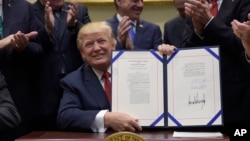President Donald Trump signed a bill Wednesday to temporarily extend a program that lets some veterans seek medical care in the private sector, part of an effort by the president to deliver on a campaign promise.
The extension will give Veterans Affairs Secretary David Shulkin time to develop a more comprehensive plan to allow veterans to more easily go outside the VA health system for care. Under the bill Trump signed into law, the VA will be allowed to continue operating its Choice Program until the funding runs out, which is expected early next year. The program was scheduled to expire on August 7 with nearly $1 billion left over.
Trump said veterans have “not been taken care of properly” and that the program will allow them to continue to be able to see “the doctor of their choice.”
“You got it? The doctor of their choice,” he repeated for emphasis.
Shulkin, who attended the bill signing, has said the money is needed to pay for stopgap services while he works on the longer-term plan. He said Wednesday that the plan is due in the fall. Congress would have to approve any changes to the VA health system.
Another avenue for care
Shulkin said the extension is important because it gives veterans another avenue for care.
“It's this approach where veterans can get care wherever they need it that really is the way that we're going to address all the needs and honor our commitments to our veterans,” he said after Trump signed the bill.
The Choice Program was put in place after a 2014 scandal in which as many as 40 veterans died while waiting months to be scheduled for appointments at the Phoenix VA medical center.
The program is intended to provide more timely care by allowing veterans to go outside the VA network only in cases where they had to wait more than 30 days for an appointment or drive more than 40 miles to a facility. Yet the program itself often encountered long wait times of its own.
The new law also calls for changes to alleviate some problems by speeding up VA payments and promoting greater sharing of medical records.
Major veterans' organizations and Democrats support a temporary extension of the Choice Program, but are closely watching the coming VA revamp of the program for signs that the Trump administration may seek greater privatization. Those groups generally oppose privatization as a threat to the viability of VA medical centers.
Trump had pledged during the presidential campaign to give veterans freedom to seek care “at a private service provider of their own choice.”
Flaws remain but ‘important first step’
Mark Lucas, executive director of Concerned Veterans for America, commended Trump for upholding a campaign promise to make veterans a priority, but said more needed to be done. Lucas said the Choice Program was a well-intentioned “quick fix” to the Phoenix scandal, but that it remains flawed and has forced too many veterans to seek care at what he termed failing VA facilities.
“Congress now has some time to work with Secretary Shulkin on broader, more permanent choice reforms that will truly put the veteran at the center of their health care and remove VA bureaucrats as the middlemen,” Lucas said. “We look forward to supporting legislation that will let veterans go outside the VA for care when they want or need to.”
Republican Senator John McCain said more than 1 million veterans have made 7 million appointments with health care providers in their communities under the Choice Program. He said those appointments would have otherwise “lagged” in the VA scheduling system.
More than 1 million out of 9 million veterans in the VA system use some Choice care, with agency data pointing to even greater use this year.
McCain, a Navy veteran, said the extension “sends an important message that we will not send our veterans back to the status quo of unending wait-times for appointments and substandard care.” He said more work is needed, but called the legislation “an important first step.”
Shulkin has said he would like to expand veterans' access to private care by eliminating the Choice Program's current 30-day, 40-mile restrictions. At the same time, he wants the VA to work in partnership by handling all the scheduling and “customer service,” something that congressional auditors say could be unwieldy and expensive.




